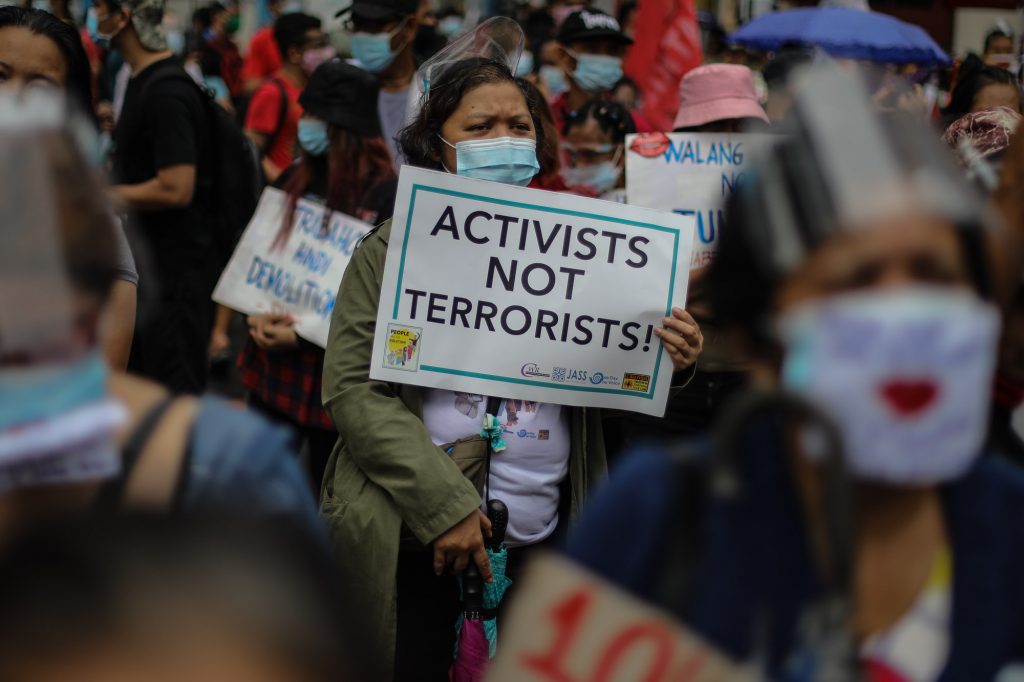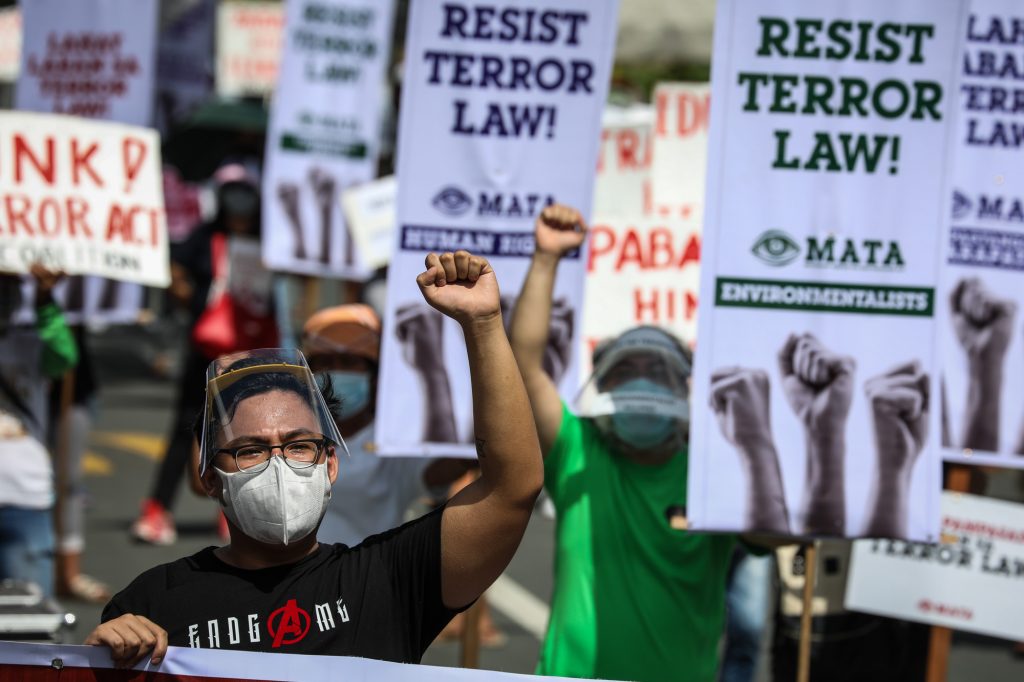
Nothing in the fell clutch of circumstance which shaped 2020 will ever change my perception of this godawful year.
Imagine the run of 365 days. It began with the threat of a volcanic eruption and ended, six days shy of New Year, with a 6.3 tremblor just off the coast of Batangas. Top that with the garroting of two children, barely out of the crib, by a father who could not bear the suicide of his wife on Christmas Eve.
On Christmas morning, while I nursed a hideous hangover, a fellow editor and journalist sent me a photo of the crime scene through Messenger. More than ever, I realize that this job comes with a steep price.
Between news items lay a trail of the blood of activists, lawyers, judges, journalists and critics of government, all in the name of the dreaded Terror Law. A police officer took his power to the next vicious level and murdered a hapless mother and son in broad daylight over a case of “disrespecting authority,” and in another, the abduction and later beheading of a 25-year-old young man from Benguet province.
Those involved in the abduction and decapitation were members of the drug enforcement unit of the Cordillera Police Office, according to a statement of the Baguio City police chief.
All this stand as mere “isolated incidents,” as Interior Secretary Eduardo Año was wont to claim, to the ravenous pandemic and the ongoing war on drugs, which, at the time of this writing, has snuffed the lives of tens of thousands of poor Filipinos, roughly 30,000 as of Amnesty International’s last estimate.
There’s more. Sometime early afternoon, news broke out that the Anti-Terrorism Council (ATC), the sprig of the Terror Law, has designated the Communist Party of the Philippines and its armed wing, the New People’s Army, as “terrorist organizations”.
The implication of the ATC’s official resolution is clear: it now “justifies” the arrest, subjugation and murder of anyone tagged as a “communist” or their sympathizers. It matters little whether there’s proof or not. Red-tagging, that vile, malodorous relic of the McCarthyism of the Cold War era, has just been legalized in the Philippines.
The ATC Resolution No. 12 was based on a petition submitted by the Department of Justice’s National Prosecution Service to the Regional Trial Court Branch 19 in Manila back in Feb. 21, 2018.
It appears that probable cause was based on 12 incidents “which constitute terrorist acts of murder, kidnapping and arson to prove that the CPP-NPA continues to commit acts of terror to sow and create a condition of widespread and extraordinary fear and panic among the populace in order to coerce the Philippine government to give in to its unlawful demand i.e. for the CPP/NPA to overthrow the duly constituted authorities and seize control of the Philippine government.”
This is where the resolution gets slippery. While refusing to name the aforementioned 12 incidents which constitute the NPA’s terrorist acts, the resolution insists that President Rodrigo Duterte’s 2017 Presidential Proclamation No. 374, calling the CPP-NPA as “designated/identified terrorist organizations under Sec. 3 (e) (1) of Republic Act 10168,” including those designations made by the United States, European Union, Australia, United Kingdom and New Zealand, were enough to justify the charge of terrorism.

I took the liberty of visiting the U.S. State Department website and yes, the CPP-NPA is still listed there as a “terrorist organization” since the designation in Aug. 9, 2002.
In a statement delivered by National Security Adviser Hermogenes C. Esperon Jr. at the First High-Level Conference of the Heads of Counter-Terrorism Agencies of U.N. Member States on June 12, 2018, the secretary has likened the actions of the CPP-NPA to the Daesh or The Islamic State of Iraq and the Levant, an extremely militant Islamic group.
“The CPP-NPA has killed more than 10,000 soldiers, policemen and civilians in one of the longest-running insurgencies in the history of the world. At one point, they were described as the New Khmer Rouge by U.S. analyst Ross Munro,” the secretary said.
While erring remarkably in calling Munro a U.S. analyst than a Canadian war correspondent, Esperon was spot on when he said that the author described the CPP-NPA as the New Khmer Rouge in a Dec. 1985 article in Commentary Magazine. This was a year before the ouster of dictator Ferdinand E. Marcos.
Munro’s writings did not mince words when it came to recounting the NPA’s so-called reign of terror, “rivaling the Khmer Rouge in savagery if not yet in scale. Most of the reports come from the countryside, where the more than 20,000 Communist guerrillas, with far less than one modern rifle per man, have a largely demoralized, corrupt, and ineffective Philippine military tied up in knots.”
Esperon, however, seems to have deliberately glossed over what Munro said as the underlying cause of the Communist insurgency during the Marcos era:
“In news reports from the Philippines, nearly all the responsibility for the Communist upsurge is being given to Ferdinand Marcos. And indeed, he has played an essential role. During his twenty years in power, the country has suffered from colossal mismanagement of its economy, corruption akin to looting, and the near destruction of the nation’s basic political institutions,” Munro wrote.
I’m not out to defend the men and women of the longest-running Communist revolution this side of the Marxist-Capitalist divide. They can do that well enough all by themselves. Their choice to go at loggerheads with the forces of the State is their right to make, either by sheer ideology or to push back against State-sanctioned brutality makes no difference.
Munro was right in saying that ruthless and corrupt tyrants like Marcos make violent revolution not only inevitable but necessary.
The current ATC resolution, tagging the CPP-NPA as terrorists, however, makes for an interesting analysis of inhuman solutions under the guise of safeguarding national security.
The last four years under the Duterte regime were anything but serene. Duterte’s orders for the police force to shoot and kill anyone involved in illegal drugs has spawned an air of impunity unprecedented in years.

As such, killings during police operations rose by 50% during the pandemic, including judges, lawyers, activists, journalists. This scarcely include those felled by motorcycle-riding assassins on a day-to-day basis—including a red-tagged doctor and her husband—even under nationwide quarantine.
The brutal crackdown on activists likewise spiked before and after the approval of the Anti-Terrorism Law, leading to the deaths of several high-profile human rights advocates.
The Philippine National Police is now scrambling to defend their ranks from public rage after a cop murdered a mother and son in an altercation best described as inheriting the madness of impunity. Journalists in their twenties are being arrested for trumped-up charges.
The Human Rights Watch 2020 Country Report, training its spotlight on the regime’s atrocities, makes the claimed “12 incidents” of terrorist acts by the CPP-NPA look like someone’s Christmas shopping list.
Under this brutal backdrop of unwarranted arrests and killings, the ATC resolution becomes a legal miracle cure against Communist “infection,” one wholly backed up by Duterte’s unlawful overthrow of the 1987 Constitution and the Bill of Rights.
Those red-tagged, often without solid proof, now fall under the heavy-handed ploys of a regime dead set on silencing its critics. Sen. Ronald “Bato” dela Rosa’s recent denial of the culture of impunity in the police force comes in the heels of the International Criminal Court finding “reasonable basis” to charge Duterte with crimes against humanity.
Given this regime’s bloody track-record, the question thus remains: shouldn’t “designated terrorist” apply to State players all the more?
Just as I was about to end this piece, I received news that a man figured in a Christmas day shooting spree in Quezon City, injuring three neighbors who allegedly beat up his nephew. Somewhere in Navotas, a stabbing incident; and in Taguig, a man murdered his own brother for being “too close” to the suspect’s partner.
That’s your Christmas wrap-up, folks. We have more than enough resolutions to last another bloody year, so don’t make any this New Year.
Joel Pablo Salud is an editor, journalist and the author of several books of fiction and political nonfiction. The views and opinions expressed in this article are those of the author and do not necessarily reflect the official editorial position of LiCAS.news.
Source: Licas Philippines
0 Comments